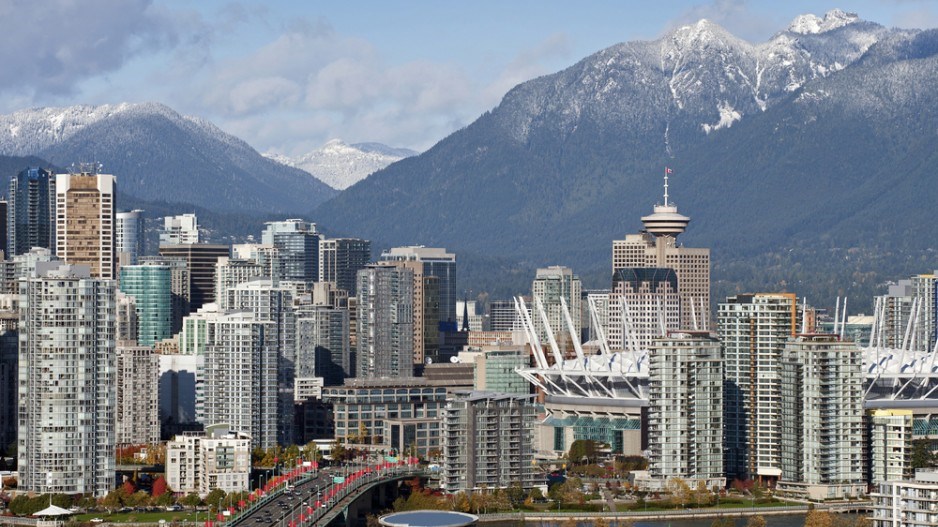The soaring price of residential real estate is one of the biggest impediments to Vancouver’s economy, and could weigh on future business growth and formation, says a prominent local economist.
“How do you grow a global-scale company in Metro Vancouver if your employees, particularly your employees in the age where they start families, can’t afford to live here?” said Jock Finlayson, vice-president and chief policy officer for the Business Council of BC.
“Looking ahead I am fearful of a hollowing out of corporate Vancouver.”
Vancouver falls squarely in the middle of the pack when it comes to economic performance, according to a report comparing Vancouver to 20 other cities in Canada and around the world. Vancouver comes in ninth on economic benchmarks and seventh on social factors. The Conference Board of Canada report was commissioned by the Greater Vancouver Board of Trade (GVBOT).
Read: How does Vancouver compare to 20 other cities?
While Vancouver scores high on quality of life, housing affordability is a big negative. The city also scores low on income levels, labour productivity and the size and number of head offices.
On the upside are trade-oriented infrastructure such as the port and Vancouver International Airport; Vancouver’s Pacific Rim location; a relatively high proportion of residents who are foreign-born; and low office rents. The report uses data available up to 2014.
The analysis shows that “we’re a middling performer. We’re neither outstanding or abysmal,” said Finlayson, who consulted on the report.
“We fall down on what I would call some of the core economic measures: productivity, incomes, productivity growth over time, and we fall down on housing prices.”
Will they stay or will they go? We asked four young professionals whether they see their future in Vancouver

Priscilla Chan, 29, event planner: "The cost of housing? It's depressing. It's pricing my age group out of the market. Ten years down the road I'd love to have a home and a family, but I don't see it happening in Vancouver. Maybe in Toronto or the U.S.? Dollar for dollar, in American cities, I can make more." | Rob Kruyt
The report shows that while Vancouver lags behind non-Canadian cities in proportion of people aged 25-34, it has the highest proportion of young residents among Canadian cities.
While multiple reports and polls have mulled the fate of millennials in Vancouver, the bigger question is what happens when those young workers mature and have families of their own, said Andy Yan, acting director of the city program at Simon Fraser University. While school enrolment numbers in Vancouver have been steadily falling, Surrey schools are bursting at the seams.
“The real important construct when looking at regions is class mobility, that you can arrive with $200 from Italy, Hong Kong or wherever and be able to build a life for you and your family and you’ll be able to feel a security of tenure to settle in the region,” Yan said.

Jeremy Waldman, 35, real estate development: "Sure it's expensive, but it's beautiful, we have healthcare, it's a safe place. The average income is low compared to large international cities like New York. But I'm going to stay here." | Rob Kruyt
“I think that’s increasingly harder and harder to do, but a place like Surrey still offers a security of tenure for both renters and owners that allow for that growth to occur. In Vancouver, as security of tenure is under huge pressure for both renters and owners.”
Vancouver has the highest income inequality compared to the other four Canadian cities included in the report: Calgary, Toronto, Montreal and Halifax.
“That has to do with the structure of employment,” Finlayson said. “There is a segment of the population that are very affluent, many of whom aren’t even working, and that’s obviously driving up housing costs.
For Finlayson, the bright spots in Vancouver’s economy — like the growing tech sector — are overshadowed by the exorbitant price of real estate.

Shannon Coutts, 29, event planner: "The heart of Vancouver is changing; our friends are dispersing. We're now looking at a place in South Surrey, right down near the Peace Arch." | Rob Kruyt
“This disequilibrium between median household income and the cost of living, particularly the cost of [housing], is the single biggest problem we have in this region,” he said.
Vancouver has been driving B.C.’s impressive recent employment gains; most of April’s new job creation came from the construction and tourism sectors. The GVBOT report highlights that the majority — 88% — of the new jobs created in the province since 1990 have been in the services sector.

Scott Garoupa, 31, apprentice cabinet-maker: "My wife and I are from Vancouver Island. In 10 years we may be here but we've talked about settling in the Comox Valley or near Victoria. It's less busy over there but still has the amenities." | Rob Kruyt
“When you drill down you need to look at the quality of jobs, how many of these jobs are permanent, full-time, and how many of them are part- time and temporary?” Yan said.
Sectors like technology build wealth, but with construction: “it’s all debt financing,” Yan said. “It’s a fundamentally different foundation of what your economy is based on. You’re going to live and die by interest rates as opposed to an idea of productivity in your work force.”
@jenstden




